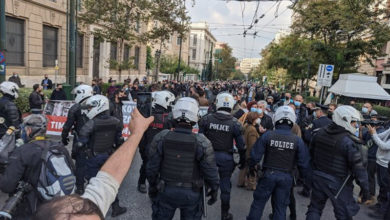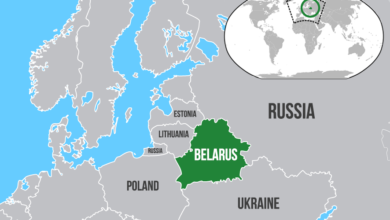After an inconclusive summit of Eurozone finance ministers held May 11 in Brussels, high-stakes negotiations are set to continue between Greece and the “Troika” of international institutions that have imposed years of devastating anti-worker measures on the country. As the current bailout-for-austerity package closes in on its end date, the political situation has been dramatically shaken up by the election of a new government led by the Coalition of the Radical Left (SYRIZA). It is attempting to negotiate a new agreement that emphasizes progressive policies it hopes will restart capitalist growth over austerity.
The Greek delegation attempted to put a positive spin on the meeting, claiming that they had their “friendliest meeting yet” with hardline German Finance Minister Wolfgang Schaeuble. Eurogroup head Jeroen Dijsselbloem took a tougher tone: “There are time constraints and liquidity constraints and hopefully we will reach an agreement before time runs out and before money runs out.”
The main points of disagreement in the negotiations are around three main issues, with the latter two becoming most prominent: privatizations, pensions and labor regulations. Any agreement that includes pension cuts, further rollbacks on the rights of workers or the continued looting of public assets would be a major embarrassment to SYRIZA. Although it has signaled its willingness to compromise in negotiations, it has simultaneously been assuring the Greek public that it will not cross its “red lines”—the anti-austerity promises made during the election campaign.
There is not complete unity within the Troika (which has been recently referred to as “the institutions” in rhetorical concessions to the SYRIZA government) on a negotiating strategy. While all have refused to deviate fundamentally from a focus on austerity, the International Monetary Fund is pressing for further debt relief for Greece. The IMF is barred by its own rules from financing a country with an unsustainable debt burden, but European governments fear the political precedent such a step would take, especially considering that a large majority of Greek debt is now held by European central banks.
In the Feb. 20 agreement, SYRIZA capitulated and agreed to implement the terms of the hated memorandum, but negotiations over how exactly to do this have been essentially stalled ever since. The government of Prime Minister Alexis Tsipras is in a bind. An agreement to implement more austerity would provoke a crisis in his party and severely dampen his public support, but SYRIZA has also ruled out a confrontation with the Troika and remains committed to the “European process” of capitalist integration. There has been no Europe-wide tidal wave in favor of old-style social democracy; Greece has been rebuffed by the center-left governments of both France and Italy.
There has, however, been a shakeup in the Greek negotiating team. Finance Minister Yanis Varoufakis has been replaced by Deputy Foreign Minister Euclid Tsakalotos as the new “coordinator” of the negotiations with the Troika. Varoufakis had fostered deep personal animosity between himself and European negotiators with his high-profile style and disdain for the norms of bourgeois diplomacy. Tsakalotos is expected to be less offensive.
Meanwhile, the Greek government’s reserves are running out as more and more loans mature, and bankruptcy appears to be only weeks away. In a last-ditch effort to round up funds, on April 20 the Greek government ordered all municipalities and most public institutions to deposit all of their reserves in the Bank of Greece, so that they would be available for repayments to creditors.
Diplomatic proxy fights
In politics, everything is connected. While financial talks are stalemated, the Greek government has attempted to exert pressure on the Troika by subverting, albeit mildly, the geopolitical strategy being pursued by the European bloc. This has primarily taken the form of overtures to Russia, with the unspoken implication that this country, which has been the focus of aggression by the European Union and NATO, could potentially be an alternative creditor for the Greek government.
On April 8, Tsipras held a high-profile meeting with Russian President Vladimir Putin. There had been speculation that an exception would be made to Greek food exports to Russia, which are being sanctioned along with other European products in retaliation for EU meddling in Ukraine. In fact, no concrete agreements came out of the meeting, but the true purpose had been served anyway.
The international flow of energy resources has become another proxy battle. Since the “South Stream” pipeline project that would pass through European Union territory had to be abandoned after the outbreak of civil war in Ukraine, the Russian government has been pushing a “Turkish Stream” plan to transport natural gas to the international market.
This would potentially pass through Greece, and on March 31 Greek Minister of Productive Reconstruction, Environment and Energy Panagiotis Lafazanis held a meeting with Russian Energy Minister Alexander Novak and Gazprom executive Alexei Miller to discuss this possibility. About a month later, U.S. special envoy for energy affairs Amos Hochstein flew to Greece to urge the Greek foreign minister to instead focus on the Trans-Adriatic Pipeline originating in Western-aligned Azerbaijan.
Tensions mount as the moment of truth approaches
The SYRIZA government’s strategy can only last so long—eventually, the state’s reserves will run out and Tsipras’ hand will be forced. Within the confines of the “European project” and the capitalist system generally, the bankers and their politicians hold all the cards.
As the decisive moment approaches where SYRIZA will either have to capitulate or lead Greece out of the Eurozone, tensions between the left and dominant right wing of the party are mounting. Minister Lafazanis is also the leader of the Left Platform—an internal minority faction in SYRIZA that is opposed to ruling out a confrontation with capital and the European Union—and he has used his ministry as a platform to take a strong position against privatizations. His statements have often contradicted the government’s negotiating team, and his tendency is backed by a sizable number of SYRIZA members of parliament.
In response, the option of a referendum on a deal with the Troika is being seriously considered. This would take the burden of leadership off of the government, who would leave it to the corporate media to launch a scare-mongering campaign around the narrative that “there is no alternative” to the euro single currency and guarantee a favorable outcome. George Papandreou, the widely despised prime minister who signed the first memorandum, attempted a similar maneuver when it became clear that a second memorandum was needed.
However, the government as a whole remains popular, and SYRIZA dominates all the opinion polls. It has launched several programs to alleviate the intense suffering felt by the most oppressed strata of Greek society, and its negotiating style is still a major change from the total obedience of previous governments.
The lack of a dynamic revolutionary alternative has left the Greek working class vulnerable to the social democratic line of compromise being promoted by Tsipras and the SYRIZA leadership. The Communist Party of Greece has unfortunately continued to follow its policy of abstention from the day-to-day drama of the negotiations and adopted a finger-wagging posture to the masses of people who are hoping for the success of the SYRIZA government over the Troika.
Should SYRIZA surrender to the bankers’ demands, as appears inevitable, it is by no means guaranteed that the Greek working class will look to the left for leadership. The fascist right wing, despite the imprisonment of its main leaders, remains a potent force.
Greece remains the weak link in the chain of advanced capitalist states. Should the ruling classes of Europe fail to resolve the crisis, the effects could be felt the world over. Now more than ever, the powerful intervention of the Greek working class and all oppressed people is greatly needed.






